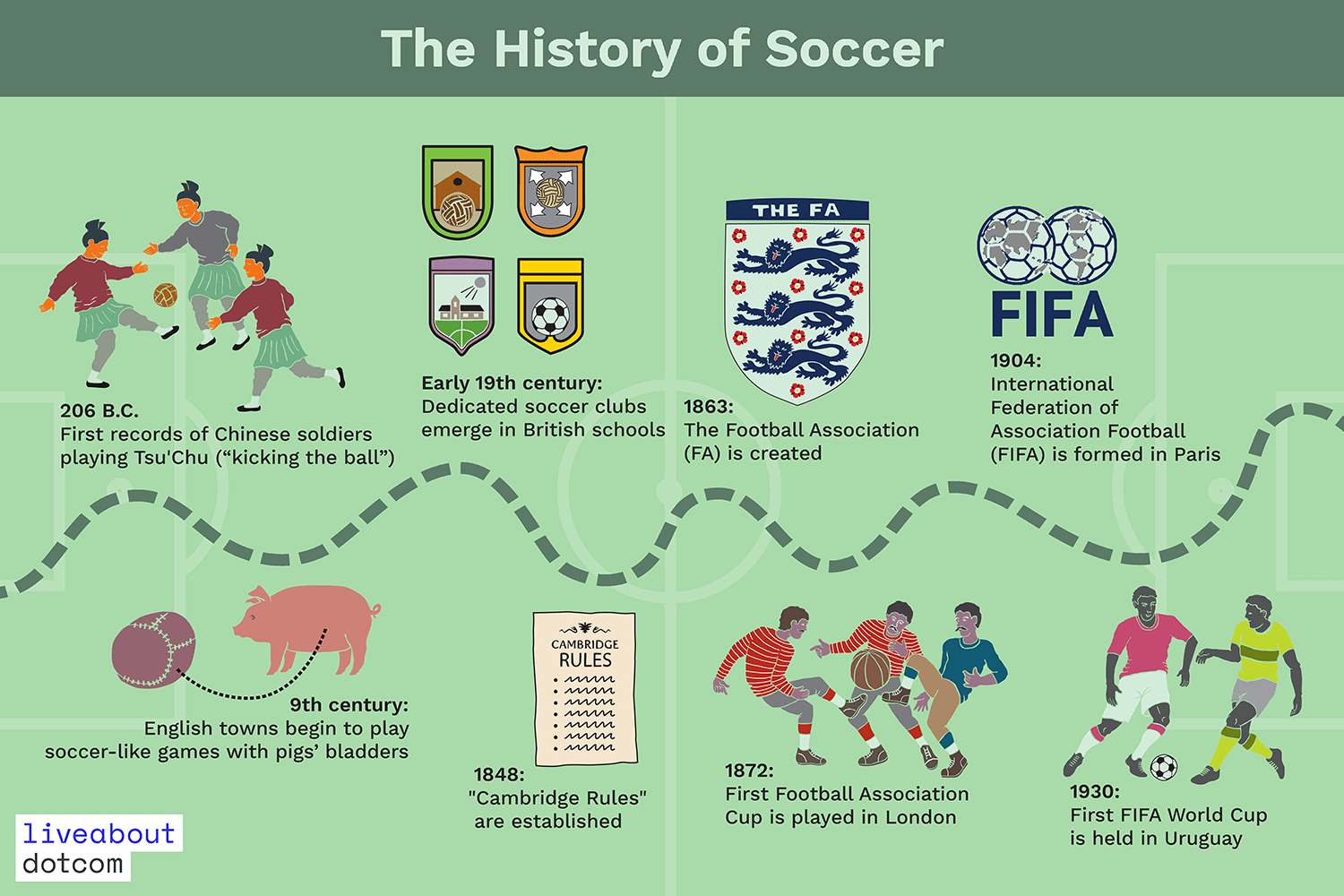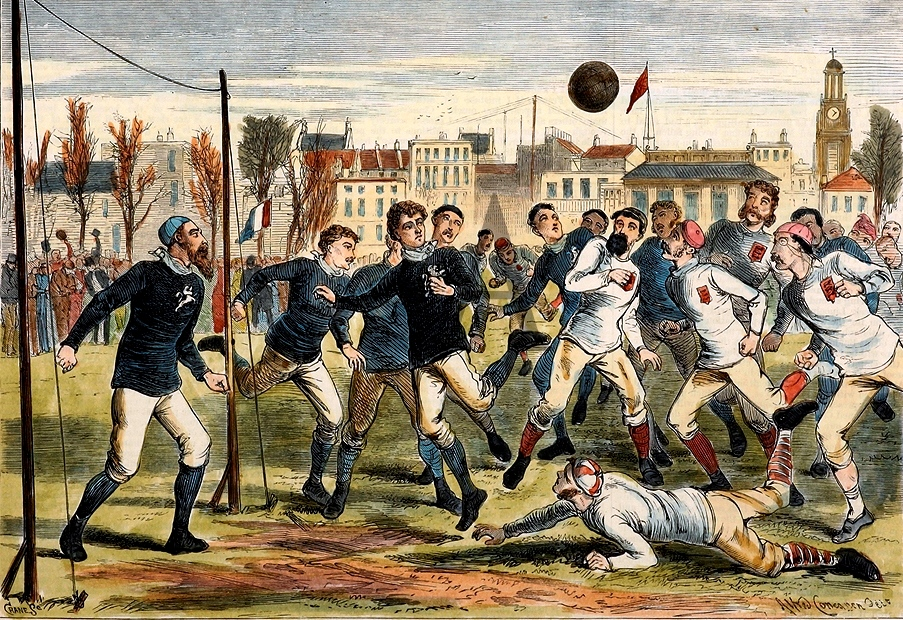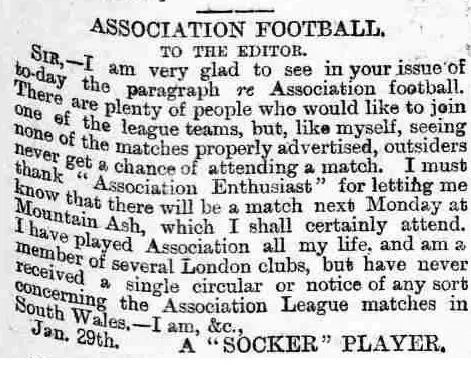Soccer Etymology: The Origin Of Soccer
If you are wondering about soccer etymology – this is for you.
The beautiful game, known globally as soccer, has a rich and complex history that stretches back centuries. Its origins are intertwined with ancient ball games played by various civilizations, but the modern sport we recognize today began to take shape in 19th century England.
The term “soccer” itself, a playful abbreviation born out of British schoolboy slang, reflects the sport’s journey from chaotic medieval contests to a well-regulated global phenomenon.
Understanding the etymology of soccer not only sheds light on the game’s development but also highlights the cultural and linguistic influences that have shaped it.

Soccer Etymology
In this article, you can read through all 5 sections or skip ahead to the topics that are most important to you. Make sure to stick around until the end, watch the video tutorial, and get your special free gift that is guaranteed to make you a better player.
- Origin of soccer
- Soccer etymology of the word
- Soccer etymology history
- Soccer etymology questions
- How to become a better soccer player, improve faster & achieve more
I hope this article gives you all you need about soccer etymology – Let’s get started!

Origin of Soccer
The origin of soccer, known as “football” outside of North America, dates back centuries. The roots of the game can be traced to ancient civilizations, where various cultures played ball games with their feet. However, the modern version of soccer began to take shape in England in the 19th century.
In 1863, the Football Association (FA) was founded in England, and it established a standardized set of rules, which differentiated soccer from rugby. Before this, the term “football” referred to a variety of games where a ball was kicked or carried.
The nickname “soccer” comes from the term “association football,” which was abbreviated to “assoc.” and then morphed into “soccer” in England. This term was used to distinguish the sport from “rugby football.”
So, the game we know and love today as soccer has evolved from a mix of ancient ball games, with its modern rules and structure solidified in England during the 1800s.

Soccer Etymology of The Word
The word “soccer” has an interesting etymology that reflects its historical development. The term comes from an abbreviation of “association football,” which was used to distinguish it from other forms of football, such as rugby football.
Here’s a breakdown of how the word “soccer” came to be:
- Association Football: In the 19th century, various forms of football were played in England. To create uniformity, the Football Association (FA) was established in 1863, and it set the rules for what was officially called “association football.”
- Abbreviation and Slang: In the late 1800s, it was common in British schoolboy slang to add “-er” to the end of words. The term “assoc,” short for “association,” was given this treatment, becoming “soccer.”
- Spread of the Term: While “soccer” and “football” were used interchangeably in England for some time, the term “soccer” became particularly popular in countries where other types of football were dominant, such as the United States, Canada, and Australia.
So, “soccer” is essentially a playful abbreviation of “association football,” and it highlights the sport’s effort to differentiate itself from other forms of football back in its formative years.

Soccer Etymology History
The history of the term “soccer” is a fascinating journey through language and cultural shifts. Here’s a detailed look at its etymology:
- Ancient Roots: Various ancient civilizations, including the Greeks, Romans, and Chinese, played ball games that involved kicking. However, these games were quite different from modern soccer.
- Medieval and Early Modern England: By the medieval period, different forms of football were being played in England. These games were chaotic and varied widely from one region to another. They often involved large numbers of players and few rules.
- Codification in the 19th Century: The need to standardize these diverse forms of football led to the formation of the Football Association (FA) in England in 1863. The FA established a set of rules for “association football” to distinguish it from “rugby football,” which allowed handling the ball.
- Creation of the Term “Soccer”:
- Association Football: The formal name “association football” was adopted to set it apart from rugby football.
- British Slang: In late 19th-century England, it was common for schoolboys to use playful abbreviations. “Association” was shortened to “assoc,” and following the slang trend of adding “-er” to abbreviations, it became “soccer.”
- Global Spread:
- England: Initially, both “football” and “soccer” were used interchangeably in England. Over time, “football” became the dominant term.
- Other Countries: In countries where other types of football were more popular, such as American football in the United States and Canadian football in Canada, the term “soccer” became the standard to avoid confusion.
- Modern Usage:
- United States and Canada: “Soccer” is the commonly used term to differentiate it from American and Canadian football.
- England and Other Countries: “Football” is the preferred term in most of the world, including the UK. However, “soccer” is still understood and occasionally used.
The etymology of “soccer” is a testament to the sport’s rich history and the cultural nuances that have influenced its development. The word itself is a product of linguistic creativity and the global spread of the game.

Soccer Etymology Questions
Here are some of the most common soccer etymology questions, along with short answers to each:
- Why is soccer called “football” in most countries?
- In most countries, soccer is called “football” because the sport involves primarily using the feet to play the ball, and this term has been used historically since the sport’s rules were standardized in England.
- In most countries, soccer is called “football” because the sport involves primarily using the feet to play the ball, and this term has been used historically since the sport’s rules were standardized in England.
- When did the term “soccer” become popular in the United States?
- The term “soccer” became popular in the United States in the early 20th century to distinguish it from American football, which was already widely played and watched.
- The term “soccer” became popular in the United States in the early 20th century to distinguish it from American football, which was already widely played and watched.
- Is “soccer” still used in England today?
- While “football” is the predominant term in England, “soccer” is still recognized and sometimes used, though it’s much less common.
- While “football” is the predominant term in England, “soccer” is still recognized and sometimes used, though it’s much less common.
- How did “football” evolve into different sports around the world?
- “Football” evolved into different sports such as soccer, rugby, American football, and Australian rules football due to varying regional rules and preferences. Each version emphasized different aspects of the original games.
- “Football” evolved into different sports such as soccer, rugby, American football, and Australian rules football due to varying regional rules and preferences. Each version emphasized different aspects of the original games.
- Did other countries besides England contribute to the development of soccer?
- Yes, while modern soccer was codified in England, many ancient cultures played ball games that influenced the development of the sport. For example, the Chinese game of Cuju and the Roman game of Harpastum had elements similar to soccer.
- Yes, while modern soccer was codified in England, many ancient cultures played ball games that influenced the development of the sport. For example, the Chinese game of Cuju and the Roman game of Harpastum had elements similar to soccer.
- What was soccer called before it was officially named “association football”?
- Before it was called “association football,” the game was simply referred to as “football” or “mob football” in various local variations, without standardized rules.
- Before it was called “association football,” the game was simply referred to as “football” or “mob football” in various local variations, without standardized rules.
- Why did the term “association football” fall out of favor in England?
- The term “association football” fell out of favor in England because “football” became the dominant term as the sport grew in popularity, and the distinction from rugby football became less necessary.
- The term “association football” fell out of favor in England because “football” became the dominant term as the sport grew in popularity, and the distinction from rugby football became less necessary.
- How did the spread of British culture influence the global terminology of soccer?
- The spread of British culture through the British Empire and its influence in countries like the United States, Canada, and Australia played a significant role in the adoption of the term “soccer” to avoid confusion with local forms of football.

Soccer Etymology: Origin Of Soccer
The evolution of the term “soccer” from “association football” is a fascinating story of linguistic creativity and cultural adaptation. While the game has ancient roots, its modern form and terminology were solidified in England during the 19th century.
The distinction between “soccer” and “football” emerged to differentiate the sport from other forms of football, particularly rugby. As the game spread worldwide, influenced by British culture and the varying popularity of other football codes, “soccer” became the term of choice in countries like the United States and Canada.
This linguistic journey mirrors the global spread and enduring appeal of the sport, underscoring soccer’s unique ability to unite people across different cultures and languages.

How To Become A Better Soccer Player
If you want to become a better soccer player, check out this 3-minute video. It’s not just another tutorial — it’s designed to help you understand your true potential as a soccer player.
Whether you’re a beginner or advanced player, the video explains how to improve your skills, develop your mindset, increase soccer IQ, and enhance your physical fitness.
You can start playing better, getting more respect from teammates, impressing your coaches, and performing with confidence under pressure.
Watch the video and discover how can your player transformation today:
Improve Your Game Today
Imagine the satisfaction of looking back and realizing that today was the day you decided to push yourself a little harder, run a little faster, and train a little longer. Tomorrow’s success is built on the decisions you make today.
Don’t wait for the perfect moment; make this moment perfect by committing to your improvement. Greatness isn’t found in procrastination — but by taking action today.
Seize the opportunity, embrace the challenge, and make a positive step towards your success. The future you want, is created by the decisions you make today.
If you really want to take another strong step in the right direction…
( continue reading )

Free Soccer Planner
Are you tired of feeling like you’re not making progress in your soccer skills? Do you want to have a more organized and effective training routine? Do you struggle with setting and achieving your soccer goals?
If you answered yes to any of these questions, the Soccer Success Planner is for you. This planner will help you stay motivated, focused, and help you achieve your goals.
Set clear goals, track your progress, and stay accountable to yourself. With helpful prompts and exercises, you’ll be able to identify your strengths and weaknesses, plan your training sessions, and maximize your performance on the field.
Start taking control of your success in soccer! You can download it here (it’s 100% FREE) – The Soccer Success Planner

Want To Improve Faster?
Not getting better at soccer? Confused about how to train effectively? Maybe you’re worried that you won’t be properly prepared for your next big opportunity? Or you just want to standout and actually feel respected by your teammates, coaches, and friends?
Whatever struggles you’re going through, The Online Soccer Academy is the best solution to help you overcome obstacles and achieve goals. Thousands of satisfied players have already used this program to achieve incredible results in record time.
With expert coaching, structured player development systems, and easy-to-follow training routines, it’s guaranteed to elevate game.
Join today and start experiencing the transformation you’ve been waiting for! Get more information here – The Online Soccer Academy

About The Author
I used to be a soccer player who struggled with self-confidence. I felt slow, weak, and unmotivated. My coaches didn’t pay much attention to me, my friends laughed at my lack of skills. At one point, I even became so discouraged that I quit the sport altogether.
Enough was enough. I decided to take control of my own development and set out on a journey to become a better soccer player. This path led me on an incredible journey of self-improvement.
I went on to win league and goal-scoring titles, earn awards, lift trophies, and received a college scholarship. I’ve even earned international caps for my country.
I started sharing my knowledge, teaching others how to become the best soccer players they could be. My YouTube channel grew to over 500,000 subscribers. I coached for top youth clubs and men’s teams. Then started my own soccer academy.

Become A Better Soccer Player
But enough about me, let’s focus on you.
If you’re looking to improve your skills, let’s take your soccer game to the next level. I want to help you make a noticeable change in style of play and overall performance on the field.
I’m passionate about helping players achieve their goals in soccer, and I’d love to be a part of your journey. I can help you reach your goals faster and achieve more in this sport, but I won’t force you. If you’re ready to take the next step, here’s what I suggest you do:
1) Download The Soccer Success Planner (FREE)
2) Apply To The Online Soccer Academy (Limited Spots)

Want more soccer training content?
Here are some related soccer articles (and videos) you might enjoy:
How To Become A Better Soccer Player in 1 Day
From Failure To Top Goal Scorer
Wishing You Success In Soccer
Coach Dylan
Progressive Soccer
Thank you for reading this article:
Soccer Etymology: The Origin Of Soccer
